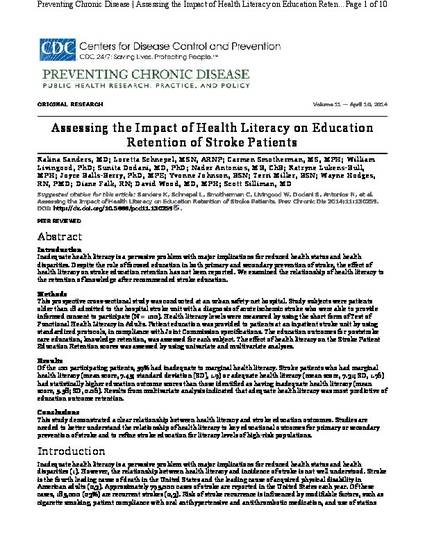
Article
Assessing the Impact of Health Literacy on Education Retention of Stroke Patients
Preventing Chronic Disease
(2014)
Abstract
Introduction
Inadequate health literacy is a pervasive problem with major implications for reduced health status and health disparities. Despite the role of focused education in both primary and secondary prevention of stroke, the effect of health literacy on stroke education retention has not been reported. We examined the relationship of health literacy to the retention of knowledge after recommended stroke education.
Methods
This prospective cross-sectional study was conducted at an urban safety-net hospital. Study subjects were patients older than 18 admitted to the hospital stroke unit with a diagnosis of acute ischemic stroke who were able to provide informed consent to participate (N = 100). Health literacy levels were measured by using the short form of Test of Functional Health Literacy in Adults. Patient education was provided to patients at an inpatient stroke unit by using standardized protocols, in compliance with Joint Commission specifications. The education outcomes for poststroke care education, knowledge retention, was assessed for each subject. The effect of health literacy on the Stroke Patient Education Retention scores was assessed by using univariate and multivariate analyses.
Results
Of the 100 participating patients, 59% had inadequate to marginal health literacy. Stroke patients who had marginal health literacy (mean score, 7.45; standard deviation [SD], 1.9) or adequate health literacy (mean score, 7.31; SD, 1.76) had statistically higher education outcome scores than those identified as having inadequate health literacy (mean score, 5.58; SD, 2.06). Results from multivariate analysis indicated that adequate health literacy was most predictive of education outcome retention.
Conclusions
This study demonstrated a clear relationship between health literacy and stroke education outcomes. Studies are needed to better understand the relationship of health literacy to key educational outcomes for primary or secondary prevention of stroke and to refine stroke education for literacy levels of high-risk populations.
Keywords
- Assessing,
- Impact,
- Health Literacy,
- Education Retention,
- Stroke Patients
Disciplines
Publication Date
April 10, 2014
DOI
10.5888/pcd11.130259
Publisher Statement
This document is under public domain.
Citation Information
Kalina Sanders, Loretta Schnepel, Carmen Smotherman, William Livingood, et al.. "Assessing the Impact of Health Literacy on Education Retention of Stroke Patients" Preventing Chronic Disease Vol. 11 (2014) ISSN: 1545-1151 Available at: http://works.bepress.com/david-wood/6/
